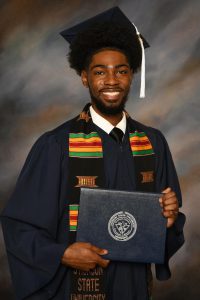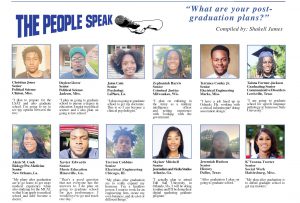Cianna Hope Reeves
Managing Editor

It’s a circumstance we all try to avoid, an emotion we never want to experience but an event we will encounter several times during our lifetime—tragedy.
Unfortunately, it’s all a part of the circle of life.
Recently in the black community, we have witnessed the rise of fatalities from racially divisive police officers to “homies on the block” and even amongst family. Sadly, violence continues to plague the streets from coast to coast, city to city, and clique to clique.
Of course, it’s not just in African-American communities. These crimes are prominent nationwide, however, what stands out to me is the frequency of tragedies in black neighborhoods. It seems that when these situations occur, people’s responses do more damage than good.
Some will react while in the heat of the moment, which means not thinking first but last and not forgiving first or last.

Prime example? Witnessing the downfall of Ferguson, Mo. when Michael Brown was fatally shot by a police officer. After hearing the news of the fallen teen, citizens gathered to peacefully protest in light of the tragic incident, while others resulted in destroying city establishments and causing mayhem in the streets.
Riots continued to assemble in the night, buildings burned, cop cars were burglarized, and intense confrontations with police lasted several days.
In this instance, revenge became the primary method of retaliation in order to relay the message: Black folks are fed-up.
Anger overruled peace and it showed through the ruin of the urban community. It is a scare tactic I have never understood because black tax-paying citizens were damaging their own to convey a deeper message.
What happened with coping? What happened with thinking before reacting? What happened with forgiveness?
Unfortunately, it is no longer the norm for black communities to lead non-violent protests like during the Civil Rights Movement. It is uncommon for boycotts to last longer than 48 hours. More frequently today, it takes a cause like an impactful tragedy to ignite change.
But then the question lies, why does it take so much trauma, anger and destruction for people to take notice? Why does it take negative attention to receive attention?
Time and time again we become spectators in crime and tragic events and we choose to react while infused with anger. We choose this form of expression because it appears that it is the only way we will be heard.
If we are quiet, we are overlooked. If we are loud, we are not taken seriously. If we are violent, we are obstructing the peace. If we weep and don’t take action, we are forgotten. Yet, if we promote “violence”, we will be remembered.
This is what happened in the case of Rodney King, Michael Brown, Tamir Rice, Alton Sterling, Philando Castile, Eric Garner, and Sandra Bland just to name a few. All of these tragedies caused heartbreaks and lead to uncontrollable and emotionally-infused demonstrations which eventually sparked national attention.
Buildings weren’t the only objects that were in flames—it was also the minds and hearts of children, bystanders, loved ones, and the community where the fatalities unfolded.
Violent protests were once common occurrences; however, now, I must admit the culture of activism for blacks has changed for the better.
In light of the late rapper Nipsey Hussle, we have witnessed a revolution. A shift in the way African-American communities responds to tragedy. Instead of seeing outraged people storm the streets or taking matters into their own hands, people within the community have built a comradery.
They have built a coalition that consists of individuals of different ethnicities, different neighborhoods, different religions and different cultures. They have joined forces rather than separating and causing conflict. They have realized that the only way to move forward after adversity is by surviving first and taking meaningful action next.
It is crucial that within the black community, we join forces with one another, build a society of active activists, form a practice of uplifting each other amidst tragedies in our own backyard, console our brothers and sisters, and provide a shoulder to cry on and spread immense love because if we don’t, who will?





Be First to Comment